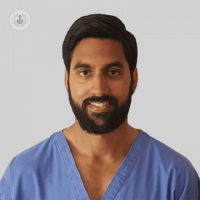Sniffing out the causes of recurrent nosebleeds
Written in association with:Nosebleeds, also known as epistaxes, are when blood streams out of the nostrils, likely originating from the thin tissue that lines the nasal passages. A nosebleed is expected after impact or injury, or during a particularly harsh winter, but if the nosebleeds are frequent, then the reason may be pathological. In this article, leading ear, nose, and throat (ENT) surgeon Mr Karan Jolly discusses the possible reasons for frequent nosebleeds and how they can be treated.

What are nosebleeds?
The nasal passages are lined with tiny blood vessels, which serve to moisten and warm the air breathed in. But because the tissue is so thin, they can dry out instead and the tissue can tear, causing a nosebleed, especially during dry weather like winter or in desert climates, or at high altitudes.
Nose bleeds can start in the front (anterior) of the nose or in the back (posterior). Anterior nosebleeds are the most common and likely have a situational cause, and will clot over promptly.
Posterior nosebleeds happen deeper in the nose, where the blood vessels are larger. These types of nosebleeds are more severe, and the blood can go down the back of the throat, which poses a choking risk.
What causes nosebleeds?
These nosebleeds can be triggered by excessive friction, allergies, and clearing out the nose often. A hit to the face or falling onto the face will also surely cause a nosebleed.
Children are quite prone to nosebleeds due to picking their noses, rough play, and putting objects in their noses.
Older people with high blood pressure, and pregnant people are also more likely to have these kinds of nosebleeds due to increased pressure on the blood vessels. This kind of bleeding is heavy enough to warrant medical attention.
A doctor should be consulted if nosebleeds are:
- heavy and long (over 20 minutes of bleeding)
- reoccurring frequently such as weekly or even daily
- and there are no lifestyle or occupational activities that they could be attributed to
A possible reason for recurrent nosebleeds, when the cause is yet unknown, could be high blood pressure, when the pressure is too much for the nose’s blood vessels causing them to burst. This could be related to obesity, diabetes, or heart issues.
If the nosebleeds are comorbid with coughing and sneezing, then it may indicate an infection in the upper respiratory tract or sinusitis.
Blood clotting disorders like haemophilia and blood thinning from medications like aspirin will cause any bleeding to have a longer active flow and difficulties at forming scabs, leaving the wound susceptible to easily bleeding anew. Similarly, leukaemia (blood cell cancer) and cirrhosis (advanced stage of liver disease) result in the reduction of platelets that build scabs and clots, to the same effect.
Further possible causes are a deviated septum, recreational drug abuse (such as ketamine and cocaine), or a complication following nose or facial surgery.
How are recurrent nosebleeds treated?
A doctor will examine the nose, using a light or endoscope to look inside the nasal passages all the way to the end. If they are unable to discover the issue with this examination, then they may order an X-ray, CT scan, or blood test to see if there are any unknown disorders or diseases responsible for the nosebleeds.
If recurrent nosebleeds are symptomatic of another condition, then treating that condition is the best way to address the nosebleeds.
Nosebleeds can be directly treated with cauterisation to seal the blood vessels and prevent further bleeding, or surgery to address the structural issues of the nose.
If you are experiencing recurrent nosebleeds with an unknown cause, you can book a consultation with Mr Jolly via his Top Doctors profile.


